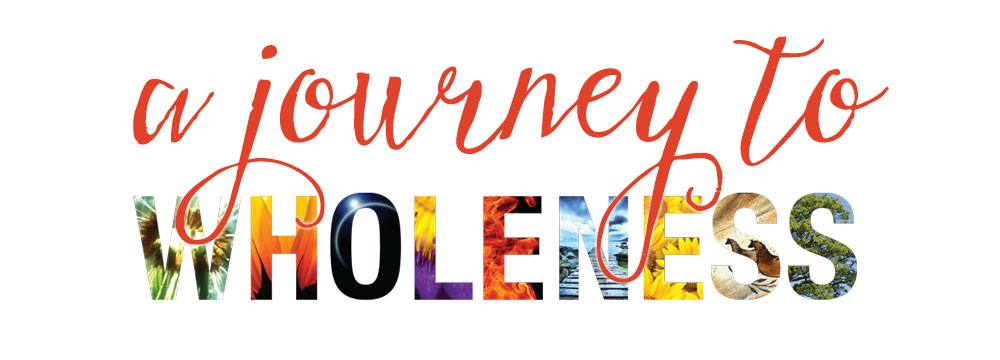
Love & Wholeness
Have you ever experienced a white-out? Where it’s snowing and blowing so hard that you can’t see anything around you? I remember once, when I was young and skiing in Colorado, a blizzard whipped up while I was on the ski lift and I couldn’t see the trees, the ground, the cables holding my chair, or where to get off!
I imagine you’ve heard the stories of farmers in the Great Plains who, when they knew a blizzard was coming, would tie a rope from their backdoor to the barn, so they could go out to care for the animals They all knew of people who had lost their way from the house to the barn, wandered off in the blizzard and froze to death.
I think this is a perfect metaphor for losing sight or connection with our own wholeness. We weren’t taught that, as we grew up, life would swirl around us – sometimes like a light beautiful snow, and sometimes like a full-on blizzard, obscuring everything around us, including our very souls and wholeness. We weren’t told that we could get lost in those blizzards and have a hard time finding ourselves again. No one told us we better tie a rope to our souls so we could find our way back. And what does that look like anyway?
What if love is the rope in the blizzard tying us to our deepest Self, our deepest wholeness?
Blizzards can take so many forms: illness, grief, disability, economic struggles, injustice, war, violence, stress, isolation, the upcoming election, loss, anger, and so much more.
Every one of these metaphorical blizzards is rooted in fear. Fear of loss, fear of not being enough, or having enough, fear of the future, fear of failure, fear of missing out (FOMO), fear of change, the list is endless.
I read an article recently reporting that there were almost 50,000 deaths by suicide in 2022; 14.3 deaths per 100,000, the highest rate since 1941. In addition, about 12.6 million Americans indicated they had serious thoughts of suicide in 2021 and, it is suspected, this number is increasing as well.
I’m sure there are many factors to this, but the bottom line is that the blizzards of life have become so strong that more and more people every year have nothing to hold onto and get hopelessly lost.
Again, what if love is the rope that ties us back to our true selves and helps us find our way through the blizzards?
The fourth Sunday in Advent is traditionally about Love. We sing, “Love came down at Christmas.” We celebrate the birth of Jesus because of the man he became, a man who lived life with a very strong “love ethic” as bell hooks would say. He walked through life guided by love, held true to himself because love guided him through the blizzards in his life.
Perhaps I need a moment to define love. Love is not an extreme case of “like.” Love is not need. Love is not dependence. Love is not conditional upon another doing or being what we want. Love lifts up, love sets free, love helps the other live fully and become the beautiful person they were created to be.
Love, defined by every spiritual path, is truly oneness. What I do to you, I do to me. Love one another as you love yourself. Do unto others as you would have them do to you.
1 John 4:18 says, “Perfect love casts out fear,” In fact, if we truly think about it: fear begets fear. Love begets love.
Russell Moore, one of the top officials of the Southern Baptist Convention resigned in 2021. This last August, he told National Public Radio (NPR) that multiple pastors had told him that when they had preached on the Sermon on the Mount (Matthew chapters 5-7), specifically the part that says to “turn the other cheek,” someone had come up after the service and asked, “Where did you get those liberal talking points?”
Moore said, “What was alarming to me is that in most of these scenarios, when the pastor would say, ‘I’m literally quoting Jesus Christ,’ the response would not be, ‘I apologize.’ The response would be, ‘Yes, but that doesn’t work anymore. That’s weak.’”
These comments are clearly driven by fear.
The weakness that people claim to see in Jesus was in reality his strength, his superpower. It was his ability to ask what love would do in any given circumstance, and then do it. We see this over and over again in the stories told about his kindness, his inclusion, his healings, his non-violence, his desire to set people free from all kinds of oppression. If he had not responded in ways aligned to an ethic of love, he would have lost himself, lost his wholeness, and not been able to show others the “way” to their own.
The way to tie that rope to our souls and live with an ethic of love is simple and difficult. It requires us to keep asking: What would love do? And then doing it. No, we won’t always be perfect. Sometimes it will be hard to balance love of self and love for others. Sometimes our anger will get in the way. Sometimes our fears will stop us. But it is so important to our own souls and sense of wholeness to keep trying.
Advent Blessings!
Kaye



